Why is the Instagram Addiction Lawsuit on the Rise?
- Last Updated: July 14th, 2025

Attorney Jessie Paluch, founder of TruLaw, has over 25 years of experience as a personal injury and mass tort attorney, and previously worked as an international tax attorney at Deloitte. Jessie collaborates with attorneys nationwide — enabling her to share reliable, up-to-date legal information with our readers.
Legally Reviewed
This article has been written and reviewed for legal accuracy and clarity by the team of writers and legal experts at TruLawsuit Info and is as accurate as possible. This content should not be taken as legal advice from an attorney. If you would like to learn more about our owner and experienced injury lawyer, Jessie Paluch, you can do so here.
Fact-Checked
TruLawsuit Info does everything possible to make sure the information in this article is up to date and accurate. If you need specific legal advice about your case, contact our team by using the chat on the bottom of this page. This article should not be taken as advice from an attorney.
Key Takeaways:
- Lawsuits against Instagram are increasing because people, especially parents of young users, believe the app's design is addictive and harms mental health.
- Studies suggest teens spend over three hours a day on social media, which can lead to addiction and developmental issues.
- If someone thinks they've been affected by Instagram addiction, it's important to talk to an attorney quickly to understand their rights and options.
Overview of Instagram Addiction Lawsuit
On this page, we’ll discuss why the Instagram Addiction lawsuit is on the rise, the driving factors of the Instagram addiction lawsuit, who qualifies to file the Instagram addiction lawsuit, and much more.
Intro To The Instagram Addiction Lawsuit
In recent years, a tidal wave of legal challenges has surged against one of today’s most influential social media platforms: Instagram
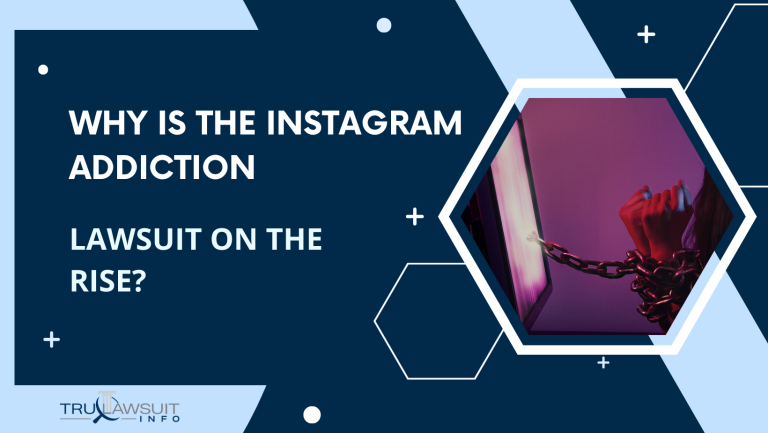
At the center of these lawsuits is a grave concern—a growing consensus that Instagram is not just an app but potentially an agent of addiction with far-reaching implications for mental health.
If you or a loved one have experienced mental health issues after developing a social media addiction, you may be eligible to file a lawsuit.
Contact TruLawsuit Info for a free consultation using the chat on this page for a free case evaluation to see if you qualify for potential legal action instantly
Table of Contents
Understanding Social Media Addiction
Social media addiction is a behavioral condition characterized by an overwhelming urge to engage constantly with social media platforms, often at the expense of other aspects of life.
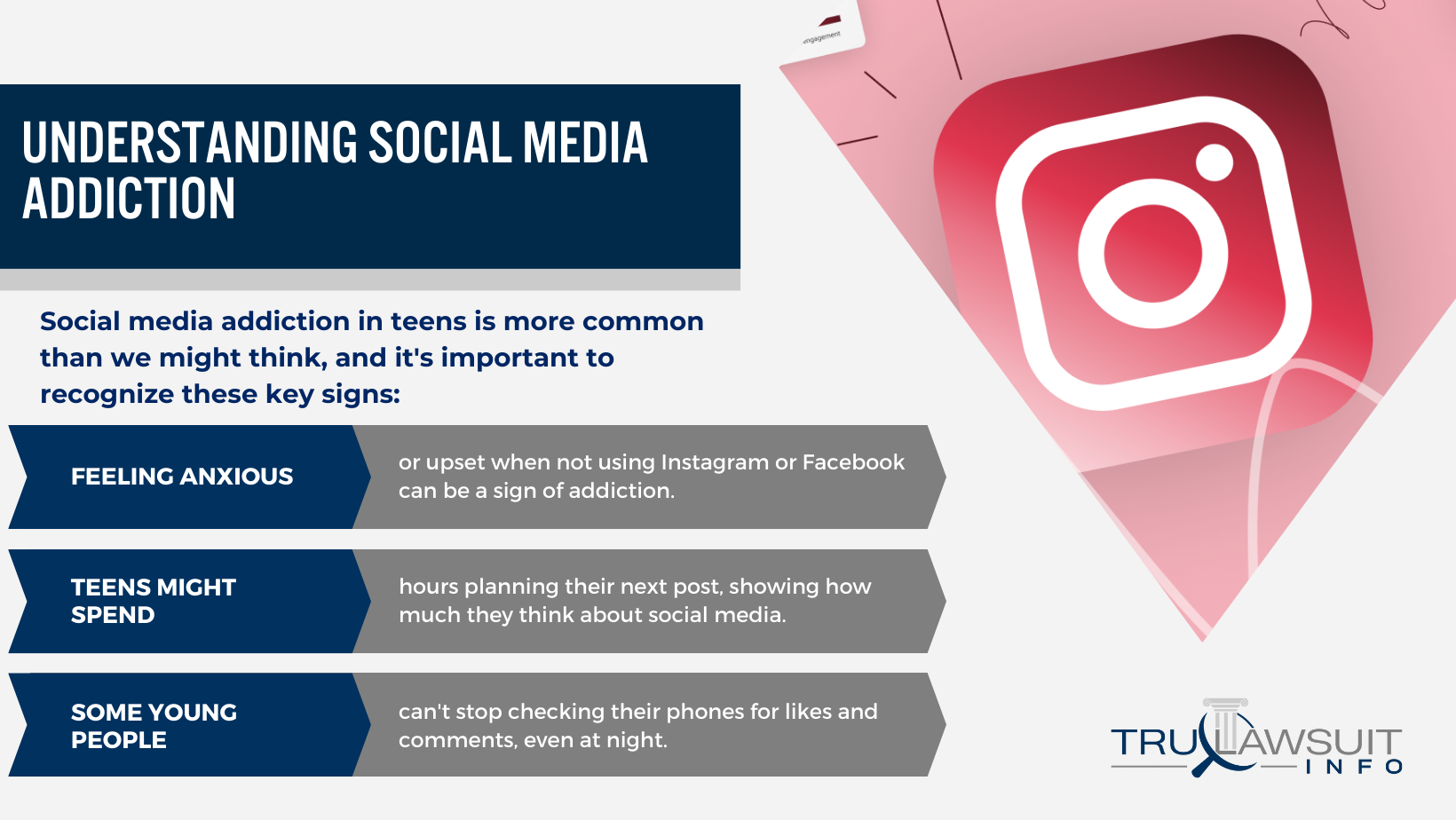
This compulsive behavior can lead to significant distress and impairment in functioning, enveloping users—particularly teens—in a cycle that’s tough to break free from.
Definition of Social Media Addiction
Social media addiction is when a person can’t stop using platforms like Instagram, even if it hurts them.
It’s a behavioral addiction that includes constant checking of apps and an intense focus on likes and shares.
This behavior often takes over a person’s life, making it hard for them to do everyday things without checking their phone or computer.
Teens stuck in this cycle may ignore school work, family time, and even sleep just to stay online longer.
They feel anxious or upset when they’re not connected.
Experts say being addicted to social media is like gambling or substance abuse because it can harm the brain in similar ways.
TruLaw is looking into cases where people got hooked on social media before turning 21 and then faced serious injuries because of it.
Lawyers are working with young people who have been through these struggles due to severe addictions fostered by social media companies’ platforms.
Signs of Social Media Addiction in Teens
Teens today are facing mental health issues related to social media use.
Many show signs of addiction that can deeply impact their lives.
Social media addiction in teens is more common than we might think, and it’s important to recognize these key signs:
- Feeling anxious or upset when not using Instagram or Facebook can be a sign of addiction.
- Teens might spend hours planning their next post, showing how much they think about social media.
- Some young people can’t stop checking their phones for likes and comments, even at night.
- You may notice teens losing sleep or changing how they eat because of social media.
- Self-esteem often drops when teens compare themselves to others online.
- A teen avoiding friends or family to spend more time on social media could be struggling with addiction.
- When a young person feels they must use Instagram constantly, it’s a sign of addictive behavior.
- Physical harm like self-harm and thoughts of suicide are linked to too much time on these platforms.
- A lack of focus in school and trouble completing tasks may stem from social media overuse.
The Impact of Social Media Addiction on Teens
The ramifications of social media addiction in teens are profound, with evidence pointing to severe mental health consequences.
As young individuals spend more time online, the fallout touches every aspect of their well-being, from emotional resilience to real-world relationships.
Mental Health Effects in Teens
Teens glued to Instagram often face serious mental health problems.
Hours spent scrolling can lead to anxiety and depression.
Many young people feel bad about themselves when they compare their lives to the perfect images they see online.
These negative feelings can grow into low self-esteem and body image issues.
In some cases, teens even start harming themselves or thinking about suicide.
Instagram is more than just pictures; it influences teen minds deeply.
It’s not just feeling down—it’s severe eating disorders and struggles with mental well-being taking over their lives.
For these young adults, every like or comment can mean a lot and sometimes leads to psychological harm that follows them off the screen.
Social media use among teens isn’t just a pastime; it has real effects on their happiness and health.
Correlation Between Social Media Addiction and Self-Harm in Teens
Many teens spend about three hours each day on social media.
This constant use can hurt their mental health.
Experts see a link between heavy social media use and self-harm among young people.
Some teens start to feel sad, anxious, or even think about harming themselves.
Studies show that being addicted to sites like Instagram and Facebook may lead to depression and eating disorders in teens.
Teen girls are at special risk for these problems.
Their self-esteem can drop from comparing themselves to others online.
The more time kids spend on social media, the greater their risk for serious issues like suicidal thoughts.
Reports say this addiction can be as strong as wanting drugs or alcohol.
It’s important that parents and schools know about these risks to help protect teen well-being.
The Emergence of Social Media Addiction Lawsuits
The rise in legal action against social media companies is a response to growing evidence of the platform’s addictive nature and its potential harm to users, particularly teens.
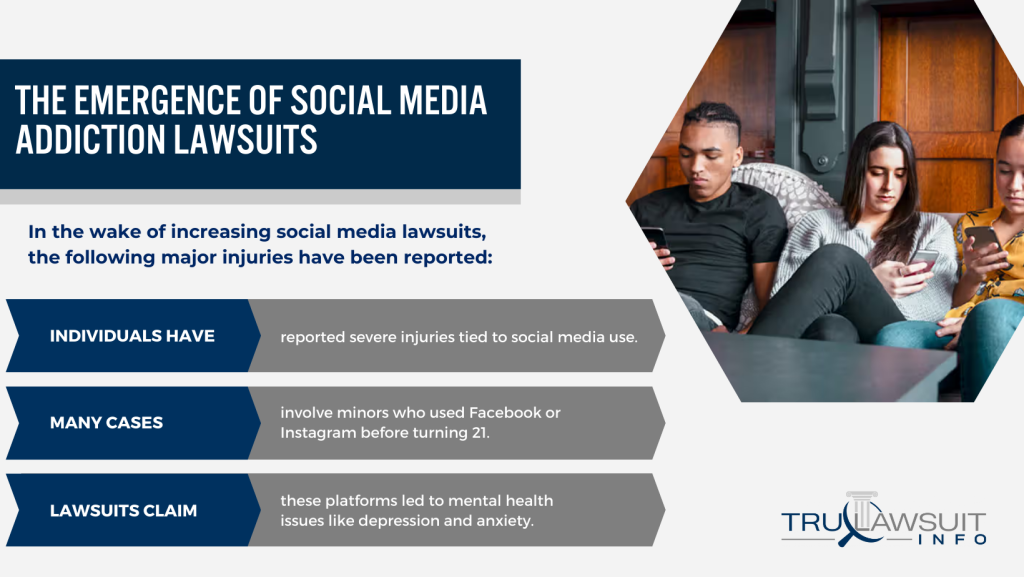
Cases are mounting as individuals and families seek accountability from giants like Meta for the psychological or physical damage linked to excessive Instagram use.
Legal Grounds of the Instagram Addiction Lawsuit
Parents and teens are suing Instagram’s parent company, Meta Platforms.
They say Instagram is addictive and harms young people’s mental health.
These lawsuits claim the app makes some users feel bad about themselves.
Teens can feel sad, anxious, or think about hurting themselves after using it.
People say Instagram knew this could happen but didn’t do enough to stop it.
Courts are taking these cases seriously.
There are 399 lawsuits grouped in California right now.
Judge Yvonne Gonzalez Rogers plans fast trials for them starting in 2025. This shows how important the issue has become and that action needs to happen quickly.
Significant Injuries Reported in Social Media Lawsuits
Social media lawsuits are on the rise.
They focus on the harm caused to users, especially young people.
In the wake of increasing social media lawsuits, the following major injuries have been reported:
- Individuals have reported severe injuries tied to social media use.
- Many cases involve minors who used Facebook or Instagram before turning 21.
- Lawsuits claim these platforms led to mental health issues like depression and anxiety.
- Some users experienced low self-esteem after spending much time on social media.
- Cases link excessive use of these sites to increased risk of eating disorders.
- Young people have suffered from suicidal ideation connected to their social media habits.
- Incidents of self-harm among teens are traced back to their use of these platforms.
- In extreme situations, individuals have attempted suicide due to addiction and its effects.
- Social media addiction claims also highlight issues related to social isolation.
- Plaintiffs argue that tech companies failed to protect the well – being of minor users.
- Attorneys point out the negative impact on school performance and personal relationships.
- Court documents reveal how addictive features prey on developing brains.
- Social media attorneys are holding companies accountable for not managing risks properly.
Studies Linking Adverse Health Events to Social Media Use
Emerging research is shedding light on the tangible consequences of social media use, particularly as it relates to adverse health events.
Noteworthy investigations have begun to establish a concrete link between extended time on platforms like Instagram and significant health complications in individuals, especially among impressionable teenage users.
Reported Cases of Social Media Addiction and Associated Health Issues
Social media addiction is growing, and reported cases show it hurts people’s health.
Studies find that too much time on sites like Facebook and Instagram can lead to depression, anxiety, and low self-esteem in teens.
Some young users face even greater risks, battling eating disorders or thinking about self-harm.
Lawsuits now reveal the scary side of social media giants.
Families say heavy use of these platforms can seriously harm teens’ well-being.
They blame companies for not protecting youth from these dangers.
Court documents from the Northern District of California show nearly 400 lawsuits are waiting to be heard.
Doctors and scientists support these claims with solid evidence.
Their research links hours spent scrolling through posts with a decline in mental health among teenagers — especially girls.
The lawsuits allege this addiction leads directly to physical injuries like self-harm or worse outcomes related to mental health crises.
Research Findings on Social Media Use and Health Risks
Studies have found troubling links between social media use and health risks.
Reports show that teenage girls who spend a lot of time on Instagram face more anxiety, depression, and body image issues.
This has been backed up by serious research from the companies themselves.
They have discovered that using Instagram can really hurt these young girls’ self-esteem.
Doctors are seeing more teens with mental health problems because of social media addiction.
Teens glued to their screens might start to harm themselves or even think about suicide.
A big leak from Facebook found out that 6% of US teen girls connect their suicidal thoughts with using Instagram.
The stats are scary but true – social media sites can severely hurt people’s well-being if they get too hooked on them.
The Defendants in Social Media Addiction Lawsuits
In the landscape of social media addiction litigation, a notable group stands accused—industry juggernauts facing allegations that their platforms contribute to psychological and physical harm in users, particularly impressionable teens.
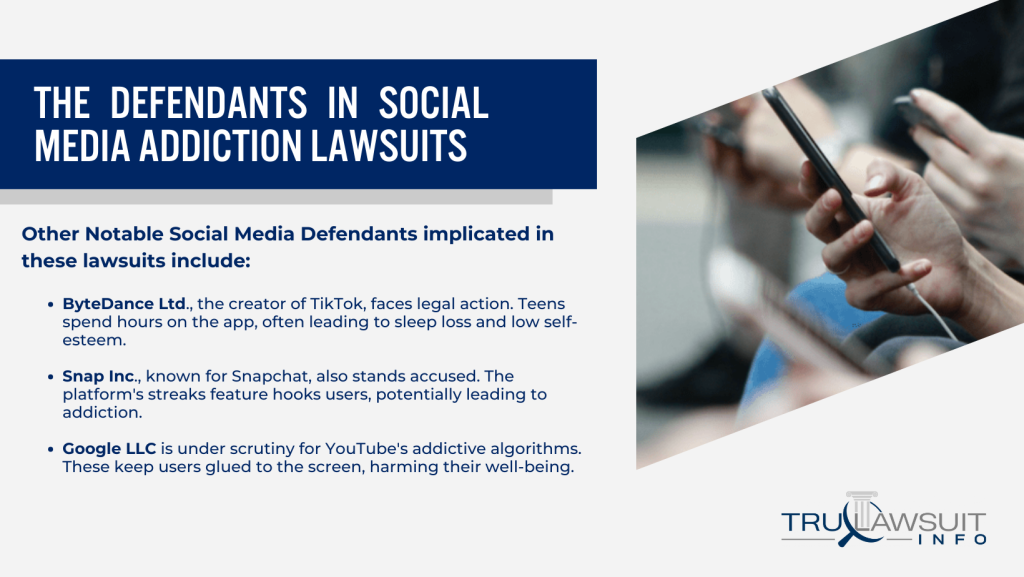
As these cases gain momentum, the defendants are thrust into legal battles over accountability and the well-being of millions of individuals affected by their services.
Lawsuits Against Facebook/Meta
Facebook/Meta faces hundreds of lawsuits.
Many parents and school districts are taking action because they believe social media harms teens’ well-being.
The company’s internal research, leaked by Frances Haugen, showed that Facebook knew about these dangers.
Courts have combined 399 cases into a class action lawsuit in California.
This decision was made by the Judicial Panel on Multidistrict Litigation (JPML).
They claim that Meta’s platforms led to mental health issues in young people.
These lawsuits could force social media giants accountable for their role in the youth mental health crisis.
Attorneys argue that products like Instagram can cause psychological or physical harm to teens.
If successful, this legal battle might change how social media companies operate.
Notable Social Media Defendants
Social media addiction is causing serious health issues.
Lawsuits are targeting companies beyond Facebook/Meta for their role.
Other Notable Social Media Defendants implicated in these lawsuits include:
- ByteDance Ltd., the creator of TikTok, faces legal action. Teens spend hours on the app, often leading to sleep loss and low self-esteem.
- Snap Inc., known for Snapchat, also stands accused. The platform’s streaks feature hooks users, potentially leading to addiction.
- Google LLC is under scrutiny for YouTube’s addictive algorithms. These keep users glued to the screen, harming their well-being.
- Claims suggest these platforms fail to protect teen mental health. Attorneys argue the addictive design choices cause psychological harm.
- The lawsuits accuse social media companies of negligence. They say that despite knowing the risks, user safety was not a priority.
- Legal battles claim deceptive practices by these companies. Allegedly, they make it hard for users to understand how addicting their products are.
- Victims report severe impacts like anxiety and depression. Some even link platform use with increased risk of self-harm among teens.
The Potential Outcome of Social Media Addiction Lawsuits
Regarding the potential outcome of social media addiction lawsuits, much remains uncertain.
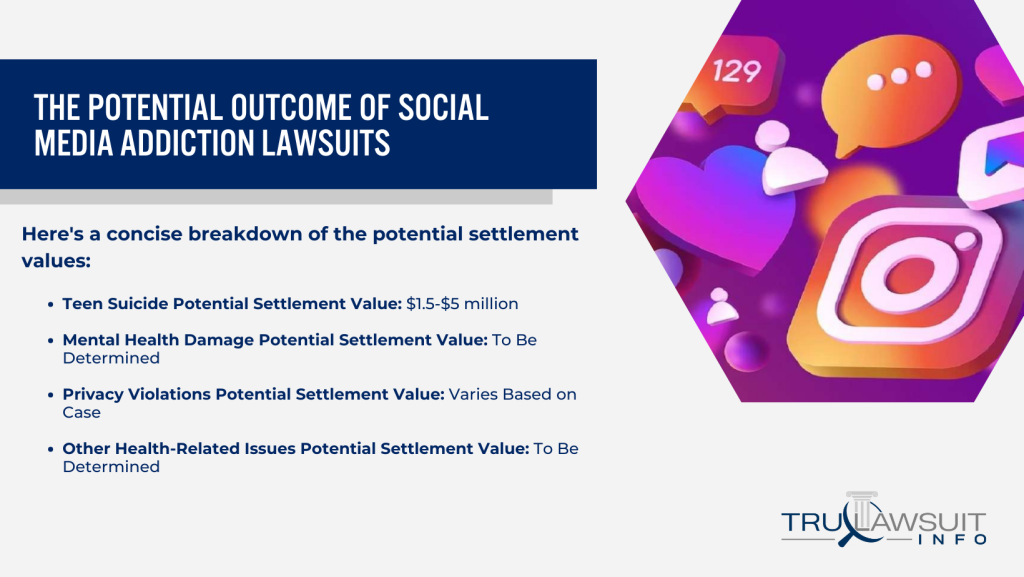
However, these legal battles could result in substantial settlements and possibly drive a wave of change across tech platforms, altering how they operate and sparking new federal regulations to protect users‘ well-being.
Potential Settlement Value
The financial implications of social media addiction lawsuits are substantial, reflecting the severity of the alleged damages.
Here’s a concise breakdown of the potential settlement values:
- Teen Suicide Potential Settlement Value: $1.5-$5 million
- Mental Health Damage Potential Settlement Value: To Be Determined
- Privacy Violations Potential Settlement Value: Varies Based on Case
- Other Health-Related Issues Potential Settlement Value: To Be Determined
These figures only provide a general perspective.
Actual settlements may vary based on case specifics and legal proceedings.
With 399 cases in the MDL, the cumulative settlement could be significant, impacting the financial landscape of social media companies.
Future Implications of the Lawsuits
Lawsuits could change how social media companies operate.
If courts decide these companies are responsible for addiction and harm, they might have to redesign their platforms.
This could lead to safer online spaces for young people.
Companies may start focusing more on well-being instead of just keeping users online longer.
Big settlements can send a strong message too.
They show that there is a high cost for harming teens’ mental health.
Social media giants like Facebook might pay millions if they lose in court.
These costs could push them to take the problem of social media addiction more seriously.
Changes in federal laws might also come from these lawsuits.
Attorneys general and lawmakers are watching closely.
They want to protect people from physical and psychological harm linked to social media use.
New laws could severely limit how these platforms work with young users’ well-being in mind.
Conclusion
Instagram addiction lawsuits are increasing because people realize the dangers of social media.
Many young users suffer from mental health issues due to these platforms.
Parents and guardians want companies like Meta to take responsibility for the harm caused.
With serious conditions linked to social media use, it’s clear why legal actions are growing.
People demand change for a safer online environment for teens.
Frequently Asked Questions
-
What is a Social Media Addiction Lawsuit?
A social media addiction lawsuit refers to legal action taken against social media companies for allegedly designing platforms that are addictive and cause harm, especially to young users.
These lawsuits claim that the addictive nature of platforms like Instagram can lead to mental health issues, including anxiety, depression, and even self-harm in teens.
-
What Leads to a Social Media Lawsuit?
A social media lawsuit typically arises when users, often represented by parents or guardians, claim that a social media platform has caused psychological or physical harm due to its addictive design and content.
The accusation is that these platforms exploit vulnerable users, leading to negative mental health outcomes.
-
How Does One Make a Social Media Addiction Claim?
To make a social media addiction claim, an individual must provide evidence that their excessive use of a social media platform directly caused harm.
This might include documentation of mental health issues, like anxiety or depression, that developed or worsened due to the use of the platform.
Legal representation is often necessary to navigate these complex cases.
-
What Responsibilities Do Social Media Platforms Have in Preventing Addiction?
Social media platforms have a responsibility to ensure their products are not harmful to users.
This includes avoiding designs that encourage addictive behaviors, especially among young and vulnerable users.
They are expected to implement features that promote healthy usage and provide warnings about potential harm.
-
What Actions Can a Social Media Company Take to Address Addiction Concerns?
A social media company can take several actions to mitigate addiction concerns, including redesigning its algorithms to discourage excessive use, providing tools for users to monitor and limit their usage, and investing in research and initiatives that promote digital well-being.
Transparency in their operations and responsiveness to the concerns raised by users and health professionals are also crucial.

Experienced Attorney & Legal SaaS CEO
With over 25 years of legal experience, Jessie is an Illinois lawyer, a CPA, and a mother of three. She spent the first decade of her career working as an international tax attorney at Deloitte.
In 2009, Jessie co-founded her own law firm with her husband – which has scaled to over 30 employees since its conception.
In 2016, Jessie founded TruLaw, which allows her to collaborate with attorneys and legal experts across the United States on a daily basis. This hypervaluable network of experts is what enables her to share reliable legal information with her readers!
Have A Case?
Here, at Tru Lawsuit Info, we’re committed to helping victims get the justice they deserve.
To do this, we actively work to connect them with attorneys who are experts in litigating cases similar to theirs.
Would you like our help?
Tru Lawsuit Info is a reliable source of information about issues that may affect your health and safety, such as faulty products, data breaches, and environmental hazards.
Our team of experienced writers collaborates with medical professionals, lawyers, and advocates to produce informative articles, guides, and other resources that raise awareness of these topics.
Our thorough research provides consumers with access to reliable information and updates on lawsuits happening around the country. We also can connect consumers with attorneys if they need assistance.
Camp Lejeune's water contamination issue spanned several decades starting in the 1950s. Exposure to these chemicals has been linked to various serious health issues, including cancer, organ diseases, and death.
Research is increasingly suggesting a link between the use of Tylenol during pregnancy and the development of neurodevelopmental disorders, such as autism and ADHD, in infants.
Legal action is being taken against manufacturers of Aqueous Film-Forming Foam (AFFF), a chemical used in fighting fires. The plaintiffs allege that exposure to the foam caused health issues such as cancer, organ damage, and birth and fertility issues.
Have A Case?
Here, at Tru Lawsuit Info, we’re committed to helping victims get the justice they deserve.
To do this, we actively work to connect them with attorneys who are experts in litigating cases similar to theirs.
Would you like our help?







